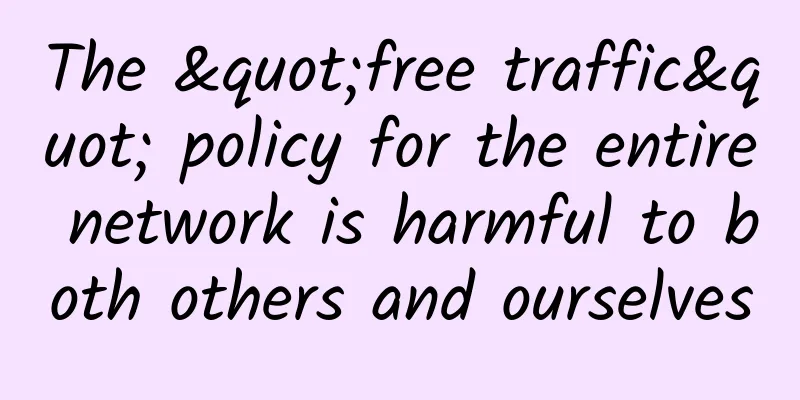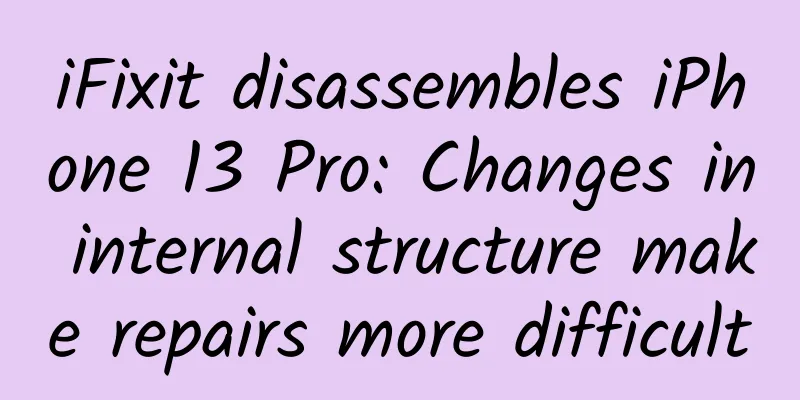The "free traffic" policy for the entire network is harmful to both others and ourselves

|
With the advent of 4G, there has been a lot of discussion about the value of mobile data traffic. Last Friday, an article titled " Free data traffic: three hurdles to overcome before full network coverage" appeared on the Internet , criticizing the traffic strategy of operators from multiple angles. The author believes that the traffic management strategy of operators is still at a very primitive stage, mainly relying on "monopoly" to make profits. The future trend should be free data traffic across the entire network, which is in everyone's interest. In fact, many of the viewpoints in the article are questionable. Let's analyze them and point out their shortcomings. Mobile Internet is not a weird shopping mall The author gives the following example at the beginning of the article: "There is a shopping mall where users need to buy tickets to enter. There is a limit on the number of stores that users can visit. If the number of stores visited exceeds the limit, additional tickets must be purchased, and the price of additional tickets is very expensive. You may ask why such a weird shopping mall exists, and doing business like this is definitely a dead end. In fact, this shopping mall exists, and you are its user, it is the mobile Internet. Modern shopping malls generally make money by collecting rent or negotiating a share with merchants. For ordinary users, it is too late to do everything possible to attract them, so why would they charge admission tickets! Users can only buy things when they visit the mall." Comparing the mobile Internet to a shopping mall is indeed a novel metaphor. Unfortunately, the author made a common sense mistake here, which is to confuse the services provided by the mobile Internet with the physical transactions provided by the shopping mall. In fact, the author is not the first person to make such a mistake. As early as the beginning of this year, Zhong Tianhua, general manager of Guangdong Mobile, made the same mistake, confusing the intangible traffic service with the physical object such as KFC family bucket, and was then besieged by many people. It can be said that although such an analogy is inappropriate, it is somewhat confusing. We know that the biggest feature of service is its intangibility. You cannot replace it with any tangible goods. When shopping in a mall, you buy tangible goods such as clothes and shoes. Merchants can only earn income by selling these goods, so merchants naturally hope that more people will come to their stores. But service is different. It is not only intangible, but the quality of the service is also closely related to the number of users. A simple example is a movie theater in a mall. If there are a lot of people entering the theater, people who want to watch a movie will not only find it difficult to choose a suitable seat, but may even not be able to buy a ticket. It is obviously impossible for a movie theater to allow consumers to enter the screening room to watch a movie without a seat, which will also affect the experience of the audience who have already bought tickets. It can be said that it is inappropriate for the author to use a mall that trades tangible goods as an analogy. A more appropriate analogy should be a place that also provides services (such as a movie theater, tourist attractions, etc.). Are operators’ traffic management really lagging behind? The author puts forward the following view in the article: "At present, operators' traffic management is still at a very primitive stage. Their income comes entirely from users' tickets (monthly rent) and is completely unrelated to merchants (CP). Even if this backward model can maintain profits temporarily through monopoly, it is definitely not a long-term solution. Moreover, this model actually greatly limits users' enthusiasm for mobile content consumption, becoming a bottleneck for the long-term development of mobile Internet." So is the traffic management of operators really as primitive and backward as the author said? The answer is naturally no. In fact, a few years ago, operators have cooperated with Internet companies to launch a large number of free or low-cost targeted traffic package services (such as Weibo, Yixin, various videos, etc.). Operators' traffic management has long gotten rid of the stage of simply charging users. Therefore, the author's statement that "traffic management income comes entirely from users' tickets (monthly rent) and is completely unrelated to merchants (CP)" is not in line with the facts. Expecting operators to provide free data for the entire network? Be careful not to hurt others or yourself! With the promotion of 4G network and the continuous improvement of people's living standards, people's demand for data traffic is also increasing. Due to certain concerns about the use of data traffic, people will not use mobile data traffic without restraint. It is for this reason that the author hopes that through the cooperation between operators and Internet companies, the entire network can eventually be free of data traffic. But is it really feasible to free data traffic for the entire network? First of all, it takes trillions of yuan to build and maintain a nationwide communication network. At present, the TD-LTE base stations built by China Mobile alone cost 300 billion yuan. Together with the FDD-LTE/TD-LTE base stations of China Telecom and China Unicom, trillions of yuan is not a small amount. To recover the cost of such a large investment, it is far from enough to rely solely on the cooperation of Internet companies. For a long time in the future, operators will inevitably charge users for traffic fees in order to recover the cost of 3G/4G network construction. It is obviously unrealistic to expect operators to provide free traffic services. Secondly, there are only a limited number of powerful Internet companies after all. Even the wealthy BAT can only provide a limited free traffic experience for a certain period of time. This is the case with BAT, let alone weaker Internet companies. Therefore, it is obviously not reliable to expect every Internet company that provides services to share the cost of Internet access for users. Finally, if the author's idea becomes a reality and the entire network does not need traffic fees, then what will the actual situation become? In a few days, the state-owned enterprises will have a long holiday. The toll-free highways in the past will be free to use during these seven days. When people hear that it is free, the number of people who choose to travel on the highways often increases dramatically. Past lessons have taught us that during the free period, the highways often become "low-speed roads" or even "parking lots". Because there are too many people using it, the highways have no way to meet people's needs for fast travel, and the experience of using them is even far worse than when they were tolled. No wonder people who want to travel by car often stay away when they hear that the highways are free. It seems that free is not necessarily a good thing. If the entire network does not require data charges, people will definitely surf the Internet without restraint. After all, network resources are limited. The consequence of using them in a rush is that everyone's experience is greatly reduced (think about the feeling of being hacked by others). It will be too late to regret when no one can use it. If you expect operators to use the entire network, be careful not to harm others and yourself! Indeed, the development of mobile Internet is advancing by leaps and bounds, and allowing users to no longer worry about traffic has become a major concern for operators and Internet companies. However, everything has its pros and cons. Whether it is free or paid, we should carefully consider the possible consequences. As a winner of Toutiao's Qingyun Plan and Baijiahao's Bai+ Plan, the 2019 Baidu Digital Author of the Year, the Baijiahao's Most Popular Author in the Technology Field, the 2019 Sogou Technology and Culture Author, and the 2021 Baijiahao Quarterly Influential Creator, he has won many awards, including the 2013 Sohu Best Industry Media Person, the 2015 China New Media Entrepreneurship Competition Beijing Third Place, the 2015 Guangmang Experience Award, the 2015 China New Media Entrepreneurship Competition Finals Third Place, and the 2018 Baidu Dynamic Annual Powerful Celebrity. |
<<: IPv6 addresses are running out, and operators are launching IPv6 pilot projects
>>: Why are iPhone 6 and iPhone 6+ so easy to bend?
Recommend
How much does it cost to make a fruit and vegetable app? How much does it cost to make a small program?
How much does it cost to make a fruit and vegetab...
Alibaba internal review | How to plan a large-scale brand event from scratch
Organizing various celebration activities is a pr...
When tasting tea in Changsha, you must find a reliable high-end tea selection place and let the experienced driver take you there
When tasting tea in Changsha, you must find a rel...
Alipay and JD.com have established an “active user” indicator system!
The Alipay app, which has hundreds of millions of...
Detailed explanation on how to make Tik Tok short video ads!
What I am going to share with you today is the ad...
5 steps for integrated marketing promotion across the entire network, this is the normal posture
Today we are going to talk about integrated marke...
Rabies mortality rate is 100%? Will people still be allowed to keep dogs?
This article was first published by Hey Stone Hea...
Smart autumn harvest | Identify compound fertilizers and distinguish true from false at the speed of light
Produced by: Science Popularization China Author:...
Is it the millet's fault? The once popular staple food is now hard to find
As a country of foodies, I guess everyone knows a...
Which one is better, Youqianhua or 360 IOU?
Recently a friend asked me which one is better, Y...
Still not fast enough? Tesla's new firmware will further improve acceleration time
Tesla CEO Elon Musk recently revealed via Twitter...
Double 11 Marketing Activity Analysis Manual
Double Eleven is approaching, and it is the day w...
Being a "nice guy" is a disease that is quietly ruining your life
In life, are you a "good guy" or a &quo...
Real-time "error correction" for quantum computers! Why don't you go to space, AI?
Quantum computers have the potential to revolutio...
Tech Neo Technology Salon No. 16 - Automated Operation and DevOps
【51CTO.com original article】 [51CTO original arti...









